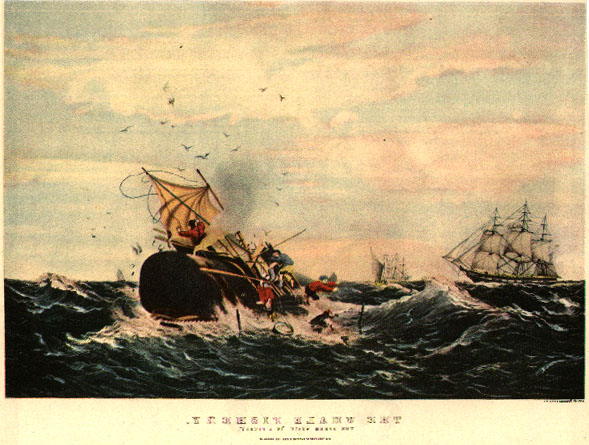Whales seem to inspire books as long as the blubbery animals themselves. First there was Herman Melville’s classic Moby Dick and then Sena Naslund’s companion piece, Ahab’s Wife. And now British author Philip Hoare has added his own nonfiction work, The Whale, to the list.
I picked it up out of love for Melville and Naslund’s works. While Hoare’s book is part chronicle of the inspiration for Melville’s, it is also part memoir of Hoare’s own experience with whales, part history of the international whaling industry, and part appeal to environmental conservation.
Hoare begins with the details of whaling in Melville’s day: large American crews departing on long, dangerous voyages in search of the Sperm Whale, an animal capable of destroying the very boats and men in search of it. The animal’s oil was rendered right on the boat and would later be used to light the lamps of New England.
 "The Sperm Whale in a Flurry," an 1850s print by Currier and Ives, depicts the dangers of whaling.
"The Sperm Whale in a Flurry," an 1850s print by Currier and Ives, depicts the dangers of whaling.
Hoare moves through time to bring the reader to a more forgotten moment in whaling history. In the 1920s, European whaling took off with more advanced technology that eliminated many of the dangers of whaling and increased the catches. In one year alone more whales were taken internationally than in a century and half of New Bedford whaling. Whale parts were ubiquitous in everyday products--lipstick, margarine, nitroglycerin, corsets, and shoe soles. And every part of the whale, from the precious oil in its head to the blank canvases of its teeth to the fragrant lumps of its excrement, was used or marketed in some way.
Although whaling has been curtailed by an international agreement, human activities still threaten their existence. Pollution, climate change, fishing nets, and military sonar all disrupt the migrations and feeding grounds of whales. And some nations, such as Japan, continue hunting. Hoare foretells of extinction in a way that calls to mind W.S. Merwin’s poem about the Grey Whale, “For a Coming Extinction.”
In the wake of the publication of Hoare’s book and the gulf oil spill, New York Times reporter Randy Kennedy noted the parallels between our current hunt for oil and the hunt for the whale in his essay “The Ahab Parallax.” But the lengthy passages in The Whale where Hoare waxes on about the mysterious beauty and near-human intelligence of the animals suggest a key difference. Our curiosity draws us to whales, the unique sounds they make, and their complex social structures. So much so that tens of thousands of pages have been written about them and that word of their near-extinction produced an international hunting moratorium. The same can’t be said for the fuels we search out these days--they are faceless compounds of dead matter. They don’t pull on our heartstrings or invite our scientific questioning. Who’s to tell us to stop?
If you’re interested in Hoare’s book, one word of advice: buy the British edition. Not only does its more majestic title, Leviathan, seem more suited for the breaching beasts, it has better quality illustrations and a sturdier binding. Not only did the Brits begin to beat us out in whaling in the 1920s, they also seem to have developed a better grip on bookbinding.
No comments:
Post a Comment